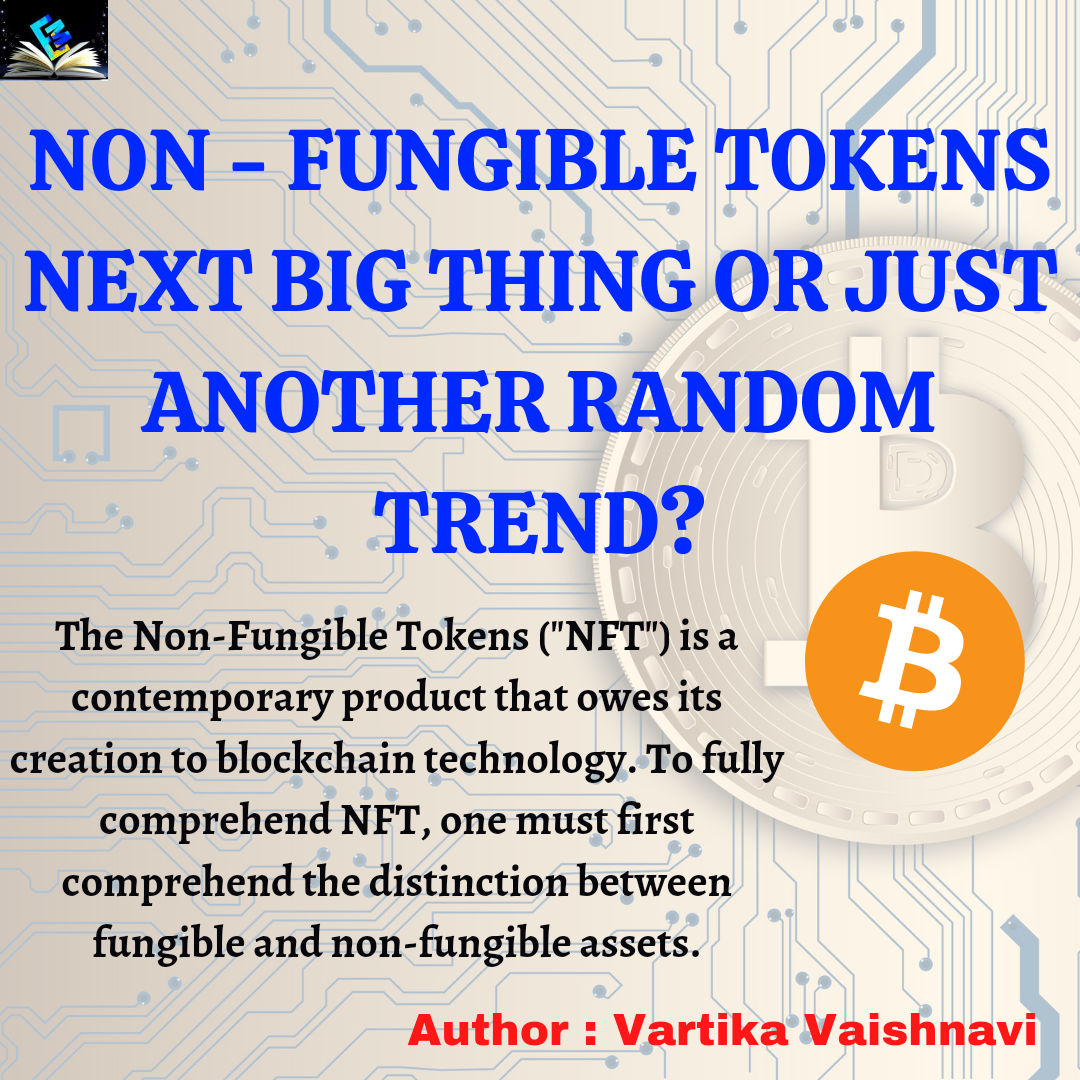
Non-Fungible Tokens : Next big Thing or another random Trend?
NON-FUNGIBLE TOKENS : THE NEXT BIG THING OR JUST ANOTHER RANDOM TREND?
AUHTOR : Vartika Vaishnavi
There was a change in conventional trust in the gold standard— “In Gold We Trust”—to the trust announced on U.S. currency— “In God We Trust”—to trust in software and networks— “In Digital We Trust”. So, let me tell you the real big thing that happened in the United States’ history was the slogan “In God We Trust” which was featured on US paper money since 1957. Now as a digital cryptocurrency, Bitcoin represents a shift in faith from “In Paper We Trust” to “In Digital We Trust.” In the last few years incredible innovation has occurred across business sectors revolutionizing the conventional lens through which these businesses were formerly seen. For example, the important financial markets notably the New York Stock Exchange which was formerly believed to be entirely the domain of the Wall Street were taken over by average people from the website Reddit in a show of total democratisation. Other recent discoveries have been propagated or accepted by the guardians of the new world order, i.e., the tech tycoons. In terms of its original aim, the growth and fall of bitcoin stands as a warning narrative in the digital age revealing how brilliant ideas that may confront power and capital accumulation become co-opted and conquered by capitalism. Even Tesla at one point announced that they will accept bitcoins as a form of payment.
Be it bitcoin or any other cryptocurrencies they all rely on blockchain which is a critical type of tech. A decentralised network that keeps track of transactions in the form of an electronic ledger is best characterised as blockchain. When a block’s storage capacity is achieved, it is ‘chained’ onto the preceding block, establishing a ‘blockchain.’ As a result, blockchain’s structure makes it almost impossible to destabilise the system. One of the reasons behind blockchain’s attractiveness is decentralisation, which ensures that no one person or group of people controls the system. Fintech is one of the first industries to understand and strive to utilise the enormous potential of blockchain technology which is why there are so many currencies on the market.
The Non-Fungible Tokens (“NFT”) is a contemporary product that owes its creation to blockchain technology. To fully comprehend NFT, one must first comprehend the distinction between fungible and non-fungible assets. A fungible asset, such as money or bitcoin, is one that may be traded for other fungible assets of the same type. In layman’s words, if a bill of money were swapped for a comparable bill or two bills of equal value, the bearer would see no distinction in monetary terms. Each NFT, on the other hand is truly unique, non-transferable and has a separate value thus no two NFTs are replaceable. NFTs have a distinct place in the art world particularly in the digital art world due to their unique features. There is no one definition of what NFTs is as evidenced by the cases that have occurred thus far. With bids exceeding USD 2.5 million, Twitter founder Jack Dorsey endorsed NFT in his tweet. In a similar spirit, Christie’s sold an artwork as an NFT for USD 69 million. As can be seen, the sums involved are far from insignificant. The origin of the NFT itself is one of the most critical questions that emerges. So, what precisely did the customer get? The buyer receives something close to a certificate of ownership for the piece of art, but unlike artwork sold in the real world he does not usually get the copyright to it. In most situations, the seller retains ownership of the copyright and other intellectual property rights. The purchaser receives a “token” that serves as proof of ownership of the original artwork. And, thanks to blockchain’s safety the possession of the NFT in issue cannot be interfered with.
In India, there is presently no legislation prohibiting the trade of NFTs. NFT has indeed been classified as a cryptocurrency and there are speculations that India will pass legislation restricting the usage of private cryptocurrencies. Possession, issuing, extraction, selling and exchanging of crypto-assets seems to be on the rise as a criminal offense. India plans to develop a mechanism for the adoption of official cryptocurrency in its stead. The RBI attempted to prohibit banks and other authorized businesses from enabling bitcoin transactions in 2018 but that prohibition was later overturned by the Supreme Court on March 4, 2020, in Internet and Mobile Association of India v. Reserve Bank of India, with a three-judge bench consisting of Justices R. Nariman, Aniruddha Bose, and V. Ramasubramanian. The court examined the issue largely through the prism of Indian Constitution Article 19(1)(g), which protects freedom to exercise any trade or engage on any profession or business as well as the fairness principle. The Securities Contract Regulation Act of 1956 may make trading in NFTs illegal, adding to the uncertainty. If an NFT is determined to be a contract in reliance for the purposes of the SCRA, it will be illegal to trade, sell, or acquire NFTs privately further aggravating the situation.
Long story short, India has an acrimonious and tumultuous history with cryptocurrencies and NFT has yet to gain traction in the Indian market or among authorities. While it is hard to anticipate how the cryptocurrency of India bill will be framed, the present approach demonstrates that private firms and individuals involved in NFTs and cryptocurrencies are on slippery surfaces. It is essential to recognize that bitcoin has acquired worldwide popularity. Bitcoin’s value skyrocketed in 2020 prompting many new investors to express great interest in it. Tesla’s 1.5-billion-dollar investment in Bitcoin, as well as their statement that it will be accepted as a form of payment added to the momentum. Coinbase, a cryptocurrency exchange located in the United States, has declared its public offering. As a result, it’s critical to consider if a ban is the best way to prevent cryptocurrencies from being misused, especially given recent worldwide advancements in the field. It will be fascinating to see how the next step in the cryptocurrency tale unfolds now that the country’s Supreme Court has removed the prohibition on cryptocurrencies. Though the cryptocurrency community in India is ecstatic by the decision, the fact that the RBI has the legal power to submit a review petition cannot be totally discounted. Because we live in an age where technological advancements are unavoidable because each one will undoubtedly bring with it new risks. It is critical to constantly update the legislation in order to keep it up to date with current changes.
REFERENCES:
- https://www.cnbc.com/2021/03/15/india-plans-cryptocurrency-ban-will-penalize-miners-and-traders.html#:~:text=News%20Videos,India%20will%20propose%20a%20law%20banning%20cryptocurrencies%2C%20fining%20anyone%2
- Ridhima Saxena, India’s Crypto Investors Weigh Options Ahead of Impending Ban, Bloomberg Quint, February 14, 2021, https://www.bloombergquint.com/business/indias-crypto-investors-weigh-optionsahead-of-impending-ban
- Internet and Mobile Association of India V. Reserve Bank of India, Writ Petition (Civil) No.528 of 2018
- Section 18A, Securities Contract (Regulation) Act, 1956
- Section 2(ac), Securities Contract (Regulation) Act, 1956
FOR ANY KIND OF QUERY MAIL US AT EDUMOUNDOFFICIAL@GMAIL.COM






